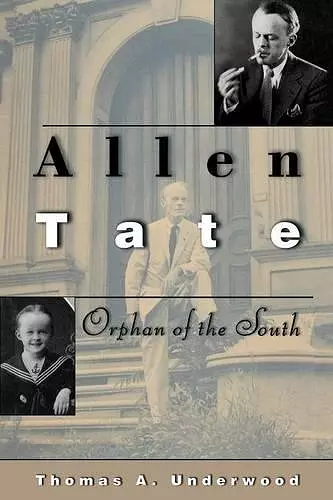Allen Tate
Orphan of the South
Format:Paperback
Publisher:Princeton University Press
Published:23rd Jan '04
Should be back in stock very soon

Informed by a broad knowledge of Southern history, Thomas A. Underwood's biography restores Allen Tate to his rightful place as the greatest poet produced by the South and as a major American man of letters. At once brilliant and subtle, it is essential reading for anyone who hopes to understand the Southern Literary Renaissance. -- David Herbert Donald, Harvard University This devious, passionate, intelligent, bull-headed, long-tailed, retrograde, fierce thinker receives justice here. Underwood's book is brave and well documented. For a writer of my generation, it reveals much literary history that we didn't know. -- Robert Bly [An] immensely detailed and tirelessly literary investigation of Tate's early career... -- Ian Hamilton
Despite his celebrity and his fame, a series of literary feuds and the huge volume of sources have precluded a satisfying biography of Allen Tate. This work explores his attempt, first through politics and then through art, to reconcile his fierce talent and ambition with the painful history of his family and of the South.Despite his celebrity and his fame, a series of literary feuds and the huge volume of sources have, until now, precluded a satisfying biography of Allen Tate. Anyone interested in the literature and history of the American South, or in modern letters, will be fascinated by his life. Poetry readers recognize Tate, whom T. S. Eliot once called the best poet writing in America, as the author of some of the twentieth century's most powerful modernist verse. Others know him as a founder of The Fugitive, the first significant poetry journal to emerge from the South. Tate joined William Faulkner and others in launching what came to be known as the Southern Literary Renaissance. In 1930, he became a leader of the Southern Agrarian movement, perhaps America's final potent critique of industrial capitalism. By 1938, Tate had departed politics and written The Fathers, a critically acclaimed novel about the dissolution of the antebellum South. He went on to earn almost every honor available to an American poet. His fatherly mentoring of younger poets, from Robert Penn Warren to Robert Lowell, and of southern novelists--including his first wife, Caroline Gordon--elicited as much rebellion as it did loyalty. Long-awaited and based on the author's unprecedented access to Tate's personal papers and surviving relatives, Orphan of the South brings Tate to 1938. It explores his attempt, first through politics and then through art, to reconcile his fierce talent and ambition with the painful history of his family and of the South. Tate was subjected to, and also perpetuated, fictional interpretations of his ancestry. He alternately abandoned and championed Southern culture. Viewing himself as an orphan from a region where family history is identity, he developed a curious blend of spiritual loneliness and ideological assuredness. His greatest challenge was transforming his troubled genealogy into a meaningful statement about himself and Southern culture as a whole. It was this problem that consumed Tate for the first...
"[A] first rate biography ...[written] with skill, care and psychological acuity."--Jonathan Yardley, Washington Post "[A] compelling account of Allen Tate's formative years ... A biographical study to be treasured as long as Tate's masterful verse attracts readers."--Booklist "The distinction of Underwood's biography lies in its exploration of how cultural identity gets into our heads, shaping us as we shape it."--Lem Coley, Oxford American "Tate is fully dramatized here as a soul in torment, a seminal figure in Southern literature."--Library Journal "An admirable recounting of how Tate began his journey to influence American poetry and criticism in the 20th century."--Kirkus Reviews "Mr. Underwood's portrait of his conservative, combative, politically naive, aristocratic, alienated subject is remarkably balanced."--Sudip Bose, The Washington Times "A well-researched, thoroughly detailed study of how the South shaped and alienated one of its best-known men of letters."--Gary Kerley, The Atlanta Journal-Constitution "Rebellious, hot-headed, arrogant, brilliant, and supremely confident in the rectitude of his controversial views, Tate makes a fascinating subject for a biographical study."--Damon Smith, The Boston Globe "A life full of improving or cautionary lessons, with vistas of a vanished literary world less glamorous by far than the jazz age legends, but with an occasional springtime whiff of genuine barnyard innocence... The interest of Underwood's volume resides ... in its portrait of the poet as a young modernist. For it is the poetry that has, despite its thorniness, stood the test of time: interesting both in its own right and as a uniquely 'pure' specimen of American modernism."--Thomas M. Disch, The Weekly Standard "Tate has been lucky in his biographer. Underwood's book is rigorously researched and sturdily written... Underwood's book is a defense of Tate's fundamental seriousness, and of the historical importance of his stances and stands."--Christopher Benfey, The New Republic "Underwood's exhaustive research and sound judgment have led to a biography of the first rank."--Ben F. Johnson III, Journal of Southern History "A splendid biography."--Henry L. Carrigan, Jr., Charlotte Observer "Underwood has made a substantial contribution to literary history and given readers a poignant portrait of Tate's struggle to come to terms with the past through art."--Melissa McIntosh Brown, Commercial Appeal (Memphis)
ISBN: 9780691115689
Dimensions: unknown
Weight: 680g
456 pages